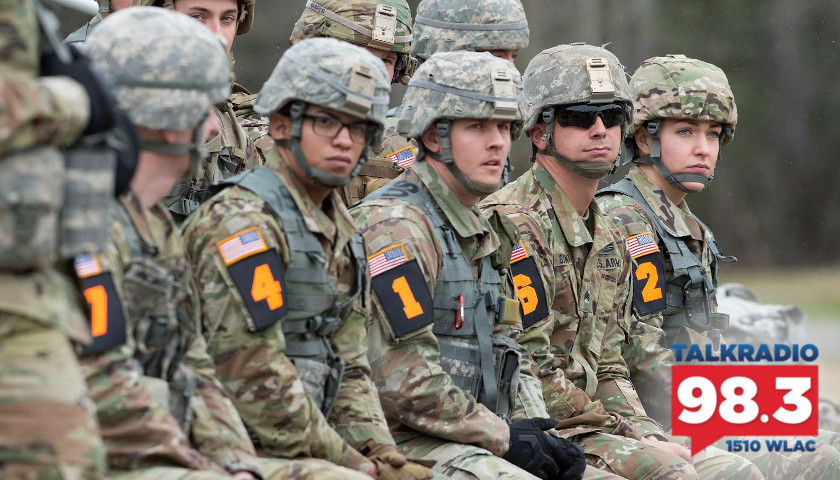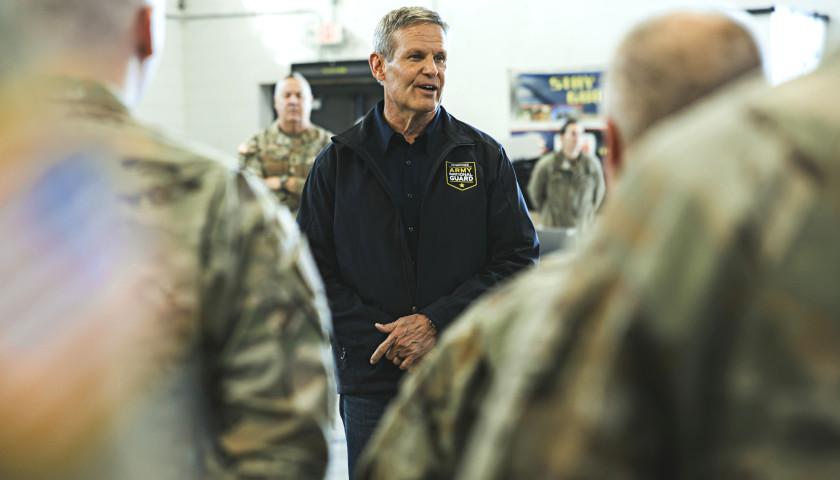Live from Music Row Wednesday morning on The Tennessee Star Report with Michael Patrick Leahy – broadcast on Nashville’s Talk Radio 98.3 and 1510 WLAC weekdays from 5:00 a.m. to 8:00 a.m. – host Leahy welcomed The Tennessee Star’s national political editor Neil W. McCabe to the newsmaker line to discuss his recent interview with National Guard Captain Mickey Shelton, and how those who refuse the vax remain in limbo, with the possibility of dishonorable discharge.
Leahy: Good morning, Sergeant First Class Neil W. McCabe. How are you this morning?
McCabe: Phenomenal and getting better every day, Michael.
Leahy: You did an interview yesterday with Mickey Shelton, a captain in the Tennessee National Guard, with an update on what’s going on with the vaccine mandate and the National Guard members who aren’t taking it. What did you find out yesterday?
McCabe: In addition to the roughly 500 members of the Tennessee Army National Guard, who are what we call straight refusals, right – these are guys who have not done a religious or a medical exemption.
They’re flat-out saying, hey, I’m not taking that thing, and I’m not looking for a way out. Captain Shelton has put in for a religious exemption, and so he’s still allowed to drill and he’s sort of awaiting his adjudication.
In addition to those 500 straight refusals, there’s roughly 400 Army National Guard recruits from Tennessee who are basically in a limbo, because they also refuse.
And so you have a massive recruiting crisis across the Army, across the country, and there are 400 recruits that could be coming into the Tennessee Army National Guard.
And basically they’re saying, hey, we’re not getting this vaccine, either. And of course, there are the normal threats where people are told, hey, this is going to blackball you.
And Shelton basically said he was told flat-out that he’ll never get promoted to major and that his career in Tennessee is over. But one of the things that they’re threatening people with is a dishonorable discharge.
And a dishonorable discharge, not only does “dishonorable” mean that you can’t use the VA hospital and you can’t get a job at the post office and you can’t use your GI bill, it also means you can’t use your firearms. You cannot own firearms.
Leahy: Whoa, hold it just a minute. Now, that is substantive and significant. I didn’t know that. Repeat that line so our listeners can grab that.
McCabe: If you have a dishonorable discharge from the U.S. military, you are not allowed to possess firearms. What I’m trying to figure out now is – maybe a listener can dial in and give me comment.
What the captain told me was that people are being threatened with this, but the separations haven’t actually happened yet, or it hasn’t been given out yet.
And I’m trying to figure out is that actually possible? And so, of course it’s possible, but if your only charge is, hey, he’s unvaxxed, well, then that’s a problem.
Let me tell you, I’ve spent some time in the military, Michael. You have no idea how difficult it is to get a dishonorable discharge. (crosstalk, unintelligible speech)
Leahy: So what you’re telling me, there are two elements to what you’re saying. You’re saying, number one, they’re being threatened if they don’t take the vax, and their discharge, they’re being threatened with a dishonorable discharge.
That’s point number one. Point number two, what you’re saying here is that – and I didn’t know this, –and give us the statutes, the law on this issue, you say if you’re dishonorably discharged from the military, you are prevented from owning a firearm. Isn’t that a violation of the Second Amendment?
McCabe: Well, yeah, but, I mean, we take away gun rights from other people.
Leahy: Like felons, in some cases.
McCabe: Right. And so basically, the dishonorable discharge carries many of the sanctions of a felony. But these guys who are not in a pay status, a lot of them have what’s called TRICARE, which is the health insurance for their family, gone.
They’re losing their life insurance. These people are being allowed to pay the premiums on their own, but the government isn’t covering their share of the premium anymore.
And the other problem that you run into is that after you’ve hammered people and put the squeeze on them and told them, hey, if you don’t play ball, you’re not going to be able to pass your GI Bill benefits on to your kids and everything else when this whole thing is over, how do you go back and act like this is normal?
How do you send a unit into combat when they have lingering resentments over how this whole COVID thing was handled? And so, there are thousands, tens of thousands, hundreds of thousands of people, when they got vaccinated, they didn’t want to get vaccinated, but they did it because of the pressure on their family and their careers. And so these guys have resentments. They know what they’re doing.
Leahy: Is that impacting, I guess the term is military cohesion?
McCabe: Yes. Good order and discipline, and it’s like, how do you go into combat with guys who have a split? I think the ramifications of this COVID vaccine mandate will be felt for a generation, and I don’t know if some units will ever recover from it.
Leahy: Neil, thank you so much for that report.
Carmichael: That’s amazing.
Leahy: It’s amazing.
Listen to the interview:
– – –
Tune in weekdays from 5:00 – 8:00 a.m. to The Tennessee Star Report with Michael Patrick Leahy on Talk Radio 98.3 FM WLAC 1510. Listen online at iHeart Radio.





